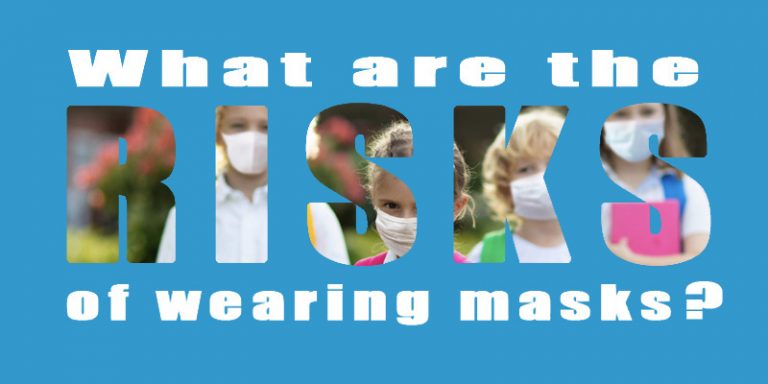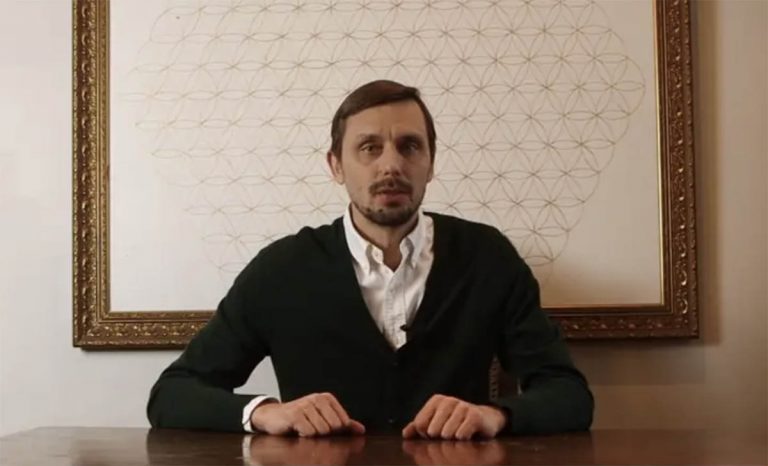Have the critics of the measures been right after all? “RKI files” with further explosive revelations
Source: The Epoch Times, Patrick Reitler, 23 March 2024
The coronavirus regulations for 2020 to 2023 were apparently not based solely on the expertise of the RKI crisis team. This is evident from the recently published “RKI files”. Despite the fact that many passages are unrecognisable, explosive questions arise even after a partial review.
The recently published protocols of the RKI crisis team (“RKI files”) are causing an uproar in the social media: all coronavirus regulations – mask requirements, lockdowns, even the immense pressure to vaccinate – appear to be based far less on the scientific and medical findings of the Robert Koch Institute (RKI) than on the political will of the federal and state governments.
According to Paul Schreyer, co-editor of “Multipolar Magazine”, this means that all court judgements based on the expertise of the RKI are on shaky ground.
2.500 pages
In May 2021, the “Multipolar-Magazin” had sued the minutes of the RKI crisis team from the period from 14 January 2020 to 30 April 2021 at great financial expense. On 20 March 2024, the magazine published the more than 2,500-page stack of documents.
Schreyer had already called on all “interested journalists and researchers” to scrutinise the documents. The combing has already begun in the social networks. The following is a preliminary selection of the findings detected so far – without any claim to completeness.
No evidence in favour of masks
As can be seen from the RKI crisis team minutes, it was already clear to the regular meeting or video conference participants around RKI head Prof. Dr Lothar Wieler on 27 January 2020 that wearing a face mask for the “public population would not be useful for asymptomatic patients”. There was “no evidence” for such considerations. Only for “symptomatic patients […] and also for caring relatives in close contact” could masks be a “sensible preventive measure for the general population”. But only “if they tolerate it”, as noted in brackets.
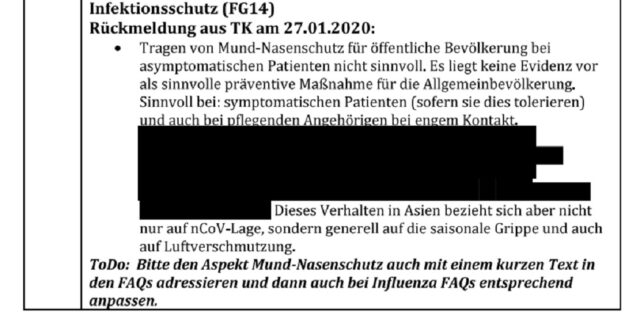
In a televised speech on 18 March 2020, the then German Chancellor Angela Merkel appealed to the solidarity of citizens and called for trust for all that was yet to come:
‘Don’t believe rumours, only the official announcements […]. We are a democracy. We do not live from coercion, but from shared knowledge and participation. This is a historic task and it can only be accomplished together.” (Video on “YouTube”)
Despite the crisis unit’s clear rejection of mask-wearing, at the end of April 2020, pressure from the federal states suddenly led to a nationwide obligation to wear masks “on public transport and when shopping”. According to information from the federal government, some federal states enacted even stricter rules. In some places, people were also no longer allowed to breathe freely outdoors for months. Various mask regulations were in force until 1 March 2023, i.e. for almost three years.
“Thanks to a successful coronavirus policy”, it was then possible to do without them, according to the website of the Federal Ministry of Health (BMG ).
On 30 October 2020, the RKI crisis team considered informing the public that there was also “no evidence for the use of FFP2 masks outside of occupational health and safety”. “Their benefit” should therefore “remain limited to occupational safety for people working with infectious patients”, the staff expressly recommended. Nevertheless, according to the “Berliner Zeitung”, the “Bund-Länder-Runde” had “enforced the mandatory wearing of FFP2 masks in almost all places at the beginning of [2021] “.
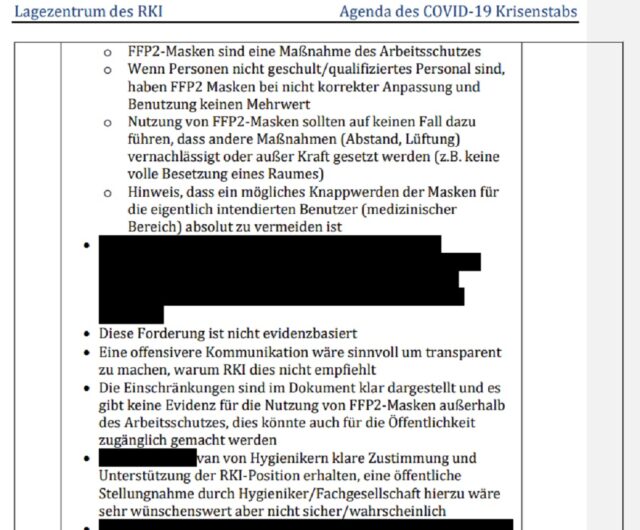
The excerpt from the RKI minutes of 30 October 2020 shows the crisis team’s negative stance on FFP2 masks. Photo: RKI files, published by “Multipolar-Magazin” on 20 March 2024
Danger of lockdown damage was known
By 16 December 2020 at the latest, the crisis unit knew from the “course of the pandemic in Africa” that there had been “indirect negative effects of the lockdown due to gaps in the treatment of tuberculosis” and the “suspension of routine vaccination programmes”. An “increase in infant mortality is therefore also to be expected locally”. “Contrary to expectations”, however, Africa only accounted for a “small proportion of global cases (3.4%)” and “only 3.6% of global deaths”. The share of the African population in the global population was and is significantly higher.
A sentence that was similar to this in May 2020 in a warning statement by Stephan Kohn, a senior government councillor at the Federal Ministry of the Interior, follows in the same context:
Consequences of the lockdown sometimes have more severe consequences than COVID itself.”
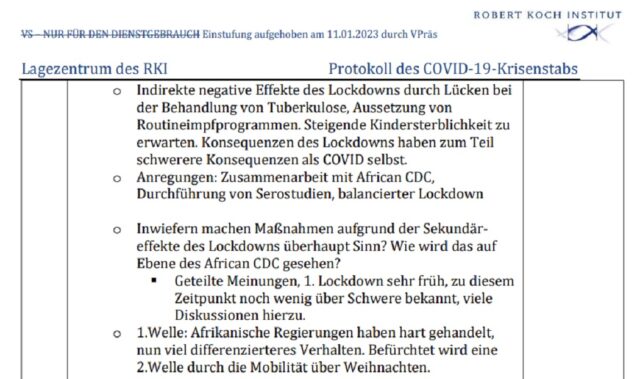
An excerpt from the RKI minutes of 16 December 2020: The text refers to the situation in Africa. Photo: RKI files, published by “Multipolar Magazine” on 20 March 2024
So why did German politicians assume that things would be different here in Germany? Because in Germany, too, according to the minutes of the same day, the rule from the beginning of the crisis was that “elective interventions” [interventions that are not urgently necessary] in hospitals should be avoided as far as possible. Officially, “to make room for COVID-19 patients”, as it was written in the “Ärzteblatt”, for example. This was to be “enforced with more pressure from the state governments”, according to the RKI minutes of 16 December 2020 – regardless of the situation assessment from Africa and despite Kohn’s warning “false alarm” analysis from the spring. Which, incidentally, cost him his career in the BMI at the time.
Vaccination campaign against better judgement?
Just six weeks after the start of the vaccination campaign at the end of December 2020, the RKI crisis team apparently reckoned that the vaccination would not change the spread of the virus. On 8 February 2021, the protocol stated:
‘It is to be expected that the vaccination can prevent severe courses, but not the local multiplication of the viruses.”
By this time, millions of vaccine doses had already found their way into the arms of German citizens. After medical staff and senior citizens were given “priority” groups in the vaccination centres, the vaccination campaign, which was backed by a lot of taxpayers’ money, picked up speed in summer 2021. Soon, as many people as possible were to be vaccinated unless there were other medical reasons not to.
During the autumn/winter season 2021/22 at the latest, political media pressure was then exerted on unvaccinated people in a way that had never been seen before in Germany. It was not just about protecting yourself, but also about “protecting others”. For many vaccination advocates in politics, the media and everyday life, anyone who did not want to take part was considered a “covidiot” or even an unsupportive “social pest” who should ideally be refused admission to an intensive care unit if they had their own health problems.
Compulsory vaccination was introduced for healthcare staff and soldiers. Those who said no were threatened with losing their jobs – usually regardless of any objections. On 7 April 2022, the introduction of a general vaccination requirement for people over 60, as vehemently demanded by the head of the Federal Ministry of Health Karl Lauterbach (SPD), failed due to a vote by members of the Bundestag.
Age as the main risk parameter for COVID-19 deaths
As can be seen from the protocol entries from 19 March 2021, almost three months after the start of the vaccination campaign and one year after the first lockdown decision, the COVID-19 crisis team had not yet been able to determine any positive effect of the vaccination on senior citizens.
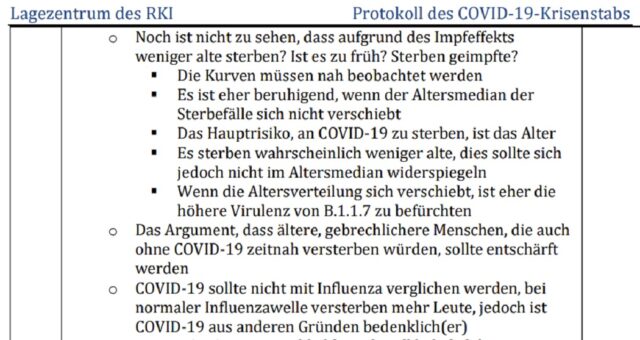
RKI crisis team on 19 March 2021: “The main risk of dying from COVID-19 is age”. Photo: RKI files, published by “Multipolar-Magazin” on 20 March 2024
The staff members around Lars Schaade, Thomas Ziese and Johanna Hanefeld (the other 18 participants’ names were blacked out as usual) explicitly recognised people’s age as the main risk of dying from COVID-19. It remains unclear why the RKI or its subordinate Standing Committee on Vaccination (STIKO) still recommended vaccination from infancy in 2022.
However, it was clear that people under the age of 65 already had around 80 per cent protection against re-infection if they had already been infected once. From the age of 65, the protective effect against infection fell to 47 per cent. “People who have already been infected cannot rely on protection,” it continued.
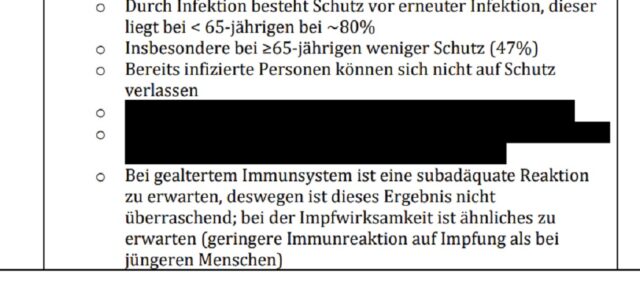
RKI crisis team on 19.03.2021: “Infection provides protection against re-infection” of up to 80 per cent. Photo: RKI files, published by “Multipolar-Magazin” on 20 March 2024
Median age of deceased within the normal range
The crisis team also stated as “not surprising” that the “vaccine efficacy” would cause a “sub-adequate response” in “aged immune systems”. This “result” referred to a previously redacted passage. The Raue law firm explained in detail in a letter on behalf of the RKI why it was blacked out. According to them, this passage concerned a “data basis” that was taken from a “foreign
In the same report, the RKI placed the median age of the deceased at 82 years, which is pretty much in line with the average life expectancy anyway. Furthermore, “no excess mortality was apparent”, and the number of deaths was even “slightly below the average of previous years”. This may be due to the “weak
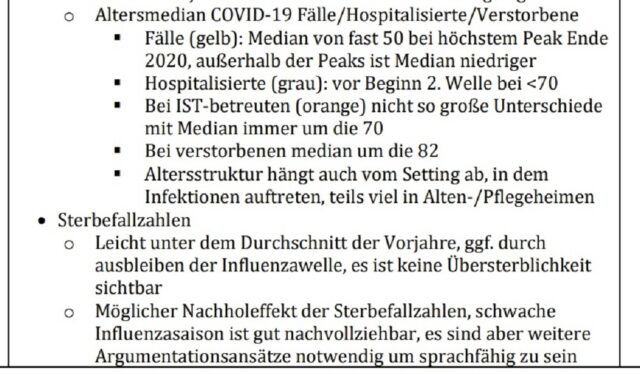
On 19 March 2021, the RKI crisis team confirmed a median death rate of 82 years and slightly below-average death rates. Photo: RKI files, published by “Multipolar-Magazin” on 20 March 2024
March 2021: “More people die during a normal influenza wave”
In its minutes of 19 March 2021, the staff spent a lot of time on the question of how things should be communicated to the outside world:
The argument that older, frailer people would die in a timely manner even without COVID-19 should be defused.
COVID-19 should not be compared to influenza, more people die in a normal influenza wave, but COVID-19 is (more) worrying for other reasons” (emphasis added: Epoch Times).
The specific reasons the crisis team considered to be of concern are not mentioned. The “Communication” section that follows shortly afterwards is almost completely blacked out. The Raue law firm explains this with the fact that it was about “the topic of vaccination readiness”, “information on certain vaccines” and “studies on the topic of vaccination readiness”. The “handling of positive rapid test results and corresponding surveys of the population” had also been discussed “between the RKI and a higher federal authority”. There had been a “proposal regarding the communication strategy”. The higher federal authority still wanted to coordinate “with a federal ministry” on the topic of “population participation in information activities”.
Around two thirds of the “Vaccination update” section of the same day was blacked out. According to the Raue law firm, it dealt with “information on side effects and the current data basis for this”. There had been “different positions” on the “recommendation of certain vaccines” and “possible causes for the occurrence of side effects” had been “discussed”.
In the months that followed, Health Minister Lauterbach repeatedly praised the vaccination as “more or less free of side effects”, for example in February 2022 on the ARD talk show “Anne Will” (video on YouTube). He only qualified his statement in March 2023.
The RKI’s law firm usually cites the fact that “the protected official consultation process is affected” as the reason for the redactions.
As of 22 March 2024, neither the Federal Ministry of Health nor the RKI has issued a statement on the RKI files.
The analysis of the “RKI files” continues. The Epoch Times is also continuing to comb through the papers in search of possible discrepancies between crisis management information and government action.
Large passages of the data pile are still unrecognisable. If these hidden contents also come to light, they could possibly reveal even more explosive information – in particular the names of the responsible actors behind the scenes and their former motives.
This is exactly what “Multipolar” publisher Paul Schreyer is fighting for: from 6 May 2024, the Berlin Administrative Court will hear whether the RKI must hand over its protocols without redactions (file number: VG 2 K 278/21).
Phantom search: Who gave the go-ahead for the measures in the first place?
It had already become clear after the publication of the first RKI Files article in the “Multipolar Magazine ” on 18 March 2024 that the official upscaling of the risk to the population in mid-March 2020 by the then head of the RKI, Wieler, had been carried out under pressure from a previously unknown, because “redacted”, source. According to a statement by the Raue law firm, there were never any documents that could have scientifically justified the upscaling.
However, someone must have given the instruction to upscale, which for three years had served as the basis for all restrictions on fundamental rights and state repression in Germany; and thus ultimately brought about the possibly irreparable division of German society and all the psychosocial, health and economic damage caused by the coronavirus crisis. Not to mention the deaths that occurred in the context of the mRNA vaccines.
The RKI files for download
The current version of the “RKI files”, large parts of which have been redacted, is available in a single 355 MB PDF file on Telegram and on Bastian Barucker’s website, among others. The “Multipolar-Magazin” also made them available for download in individual daily logs on the “HiDrive” platform. The Raue law firm’s statements on the redactions can also be viewed on HiDrive.
Suggest a correction


